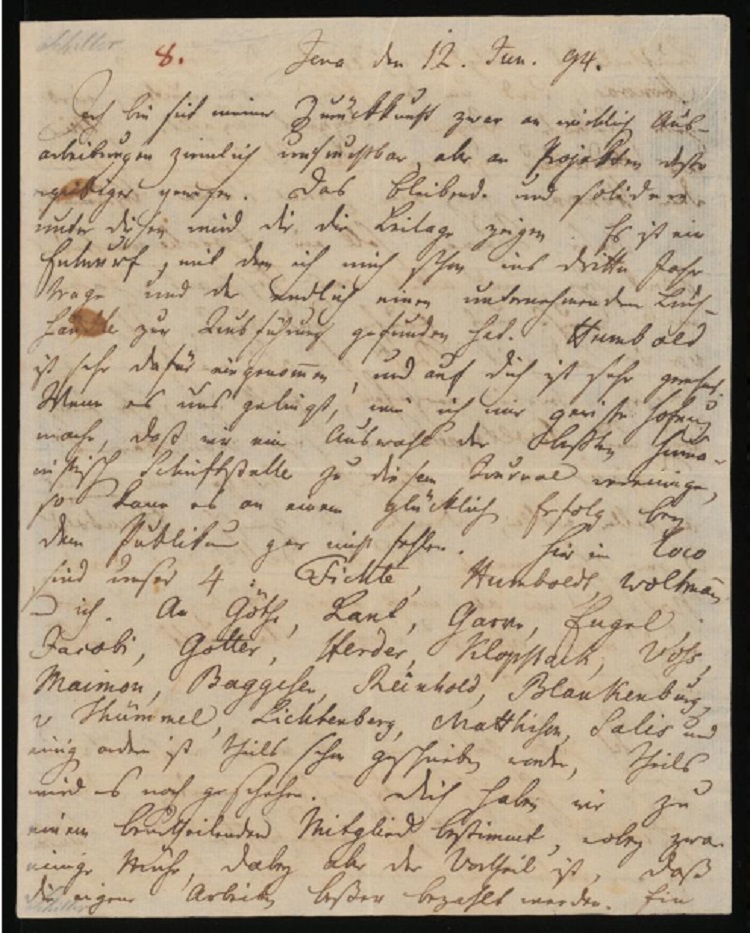University of Freiburg Students Prepare Exhibition on the Fascination with Manuscripts
Freiburg, Feb 14, 2023
A text from the hand of Leonardo da Vinci, including drawings; a “joke canon” once notated by Ludwig van Beethoven; several handwritten poems and letters of the Alemannic dialect poet Johann Peter Hebel: The collection of the Basel industrialist Karl Geigy-Hagenbach includes around 3000 autographs, handwritten records from important artists, inventors, and politicians that he collected in a period spanning over 60 years in the late nineteenth and early twentieth centuries. Prof. Dr. Dieter Martin and Dr. Maximilian Bach from the University of Freiburg’s Department of German have designed an exhibition on the fascination with manuscripts and the Geigy-Hagenbach Collection. It opens on 23 March 2023 at the University Library in Basel, Switzerland. University of Freiburg students from the master’s program in modern German literature also collaborated on it.
 Letter from Friedrich Schiller to Christian Gottfried Körner, Jena, June 12th, 1794. Source: UB Basel, Autogr Geigy-Hagenbach 1066,
Letter from Friedrich Schiller to Christian Gottfried Körner, Jena, June 12th, 1794. Source: UB Basel, Autogr Geigy-Hagenbach 1066,
https://www.e-manuscripta.ch/bau/content/titleinfo/3172387
Documents of Outstanding Figures
“A manuscript is a contact relic,” says Bach: It conveys the feeling of being in contact with its creator – and thus with an important artist figure. “Geigy probably collected out of a love of culture; collecting was a possibility for him as a businessman to pursue his cultural interest.” Born in 1866, Geigy-Hagenbach collected manuscripts over a very long period of time and had a considerable fortune from the chemical industry at his disposal, so the collection ranks among the most significant of its time. However, he was not alone with his passion: The personal documents of outstanding figures had held a fascination for broad circles of the educated bourgeoisie since the end of the eighteenth century; collecting was widespread.
“But the origins go all the way back to the time of the Reformation, when contemporaries began collecting the letters of important reformers like Luther and Melanchthon,” says Martin. The interest in their writings was mixed with a fascination for the important personalities. In fact, manuscripts can still be interesting today from a philological perspective: “The hope is that one will find clues about the writing of works there, such as corrections or different versions.” The idea of being personally close to the artists plays a role here as well: “It’s as if one were observing an author at work,” says Bach.
Students Work Out Exhibition Concept and Write Texts for the Catalog
It was a special experience for the students of their master’s seminar in the 2022 summer semester to work with the old texts in the manuscript reading room of the Freiburg University Library, says Bach. “That also helped them to get over the initial frustration that occasionally arose when they couldn’t decipher anything at first.” The students and their two teachers worked out a concept for the exhibition on the basis of around 20 selected manuscripts and wrote texts for the catalog – another important experience, says Bach: “The ability to also produce texts other than research papers is a key skill in the humanities.”
On the one hand, the exhibition seeks to provide insights into the important collector Geigy-Hagenbach and present his collection. On the other hand, it is dedicated to the cultural history of the fascination with manuscripts, the history of collecting, and questions about issues like authenticity or also forgeries, which arose when the trade in manuscripts became a lucrative business. To accompany the exhibition, the Basel University Library will review the history of the collection and attempt to determine the provenance of all autographs, most of which are now in the library’s possession. Also planned is an online presentation of the entire collection.
Many students worked with manuscripts for the first time in the seminar, says Martin: “One of our goals was to introduce them to sources and thus to the insight that texts have a history and various manifestations.” He observes a newfound interest in historical transmission and materiality in the humanities. And Bach adds: “Perhaps this is a reaction to digitalization – the manuscript is being rediscovered as a distinct cultural form at the moment when it is no longer a matter of course to produce them.”
The exhibition “Ein Pantheon auf Papier. Die universale Autographensammlung Karl Geigy-Hagenbach (1866–1949)” (A pantheon on paper: The universal autograph collection of Karl Geigy-Hagenbach [1866–1949]) runs from 24 March 2023 to 21 June 2023 at the University Library in Basel, Switzerland, Schönbeinstrasse 18–20.
Vernissage: Thursday, 23 March 2023, 6 p.m., with Ueli Dill, Maximilian Bach, and Dieter Martin.
Special event: Wednesday, 3 May 2023, 6–7:30 p.m., Hunters and collectors - a panel discussion on the fascination of autographs with Vinzenz Brändle ("Swiss Autograph King"), Alain Claude Sulzer (Basel) and PD Dr. Irmgard Wirtz Eybl (Swiss Literary Archives, Bern).
Closing event and finale of the transcriber competition: Wednesday, 21 June 2023, 6 p.m., with Ueli Dill, Maximilian Bach, and Dieter Martin.
The exhibition catalog, Ein Pantheon auf Papier (A pantheon on paper) comes out on 13 March 2023 in printed form and as an open access publication: https://schwabe.ch/Ein-Pantheon-auf-Papier-978-3-7965-4722-5.
Online Presentation: An independent online presentation of the Geigy-Hagenbach Collection is still being prepared. However, numerous collection items are already available online via the e-Manuscripta portal: https://www.e-manuscripta.ch/bau/content/titleinfo/836306
Users are welcome to help complete this task and transcribe manuscripts themselves.

